Sue Brayne in conversation with psychotherapist and Positive Deep Adaptation facilitator Justine Corrie as part of the Living Consciously for a Better World series of interviews, which provide food for thought in this time of uncertainty, challenge and change.
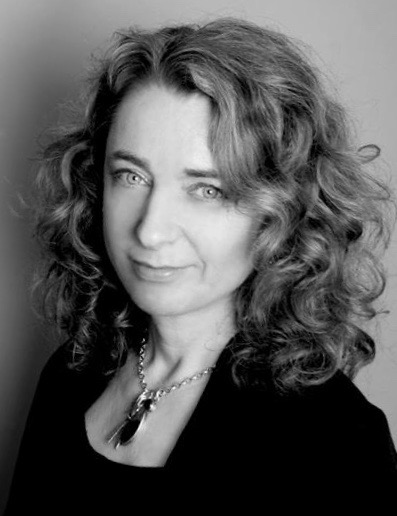
Justine Corrie lived and travelled extensively in Asia in the 90’s and during 2015 and 2016 volunteered in the Jungle camp in Calais and Grande-Synthe in Dunkirk where she initiated support systems for the network of grass-roots volunteers across Europe. She has been working as a Core Process psychotherapist since 2012 – a therapeutic model which brings together Buddhist psychology of self, transpersonal and western trauma-informed models to orient towards the person’s core state of inherent health. She is also a group facilitator and has been a Positive Deep Adaptation facilitator since September 2019 after she read Professor Jem Bendell’s paper, Deep Adaptation: A map for navigating climate tragedy.
Justine’s profound personal experiences of death and dying has inspired her to facilitate death cafes and to address our cultural reticence to speak openly and honestly about loss, bereavement and the dying process, especially as we are facing a very uncertain future.
Sue: Can you explain the impact that reading Jem’s Deep Adaptation paper had on you.
Justine: There was a deep relief and resonance in reading his paper. It was about so much of what I’d been considering for many years. I’d already been active in facilitating Inner work for social change groups for a number of years and had been fairly involved the previous year with Extinction Rebellion, supporting regenerative culture at a national level. I’d also been engaged in my own grief process around climate collapse and felt I would be a good fit and resource with the emerging PDA facilitation group.
Sue: You and I met on Jem’s Deep Adaptation retreat in September last year, and you took part in the death café. What was that like for you?
Justine: Again, it was such a relief. I’ve been aware for a very long time that in our western culture the mainstream relationship to death is a really unhealthy one. I found taking part in the death cafe was a really welcome experience and something I have yearned for. It’s a space to have those easy flowing open, honest, real conversations about probably the most important part of being alive, which is that we’re all going to die.
Over the years I’ve been influenced by a lot of eastern culture and spiritual practices. I lived in India on and off over a period of 10 years and death is regarded so much as a part of life. If you go to Varanasi and down to the burning ghats, you see bodies being burnt in front of their families. It’s a serviceable, open, organic process where people are very much in contact with death. The family tends the bodies of their own. They are not sent to an undertaker. Death is very integrated into life.
Sue: Yes, it’s quite an experience. I will never forget walking to the post office in Varanasi and finding a body being carried past me on a stretcher at nose height by relatives who were taking it to the ghats. And, this is going on right at this very moment in Varanasi, because it’s part of Indian culture. It makes me wonder why we have become so precious around death. Why do you think we have removed ourselves from it?
Justine: I wonder whether it’s to do with our disconnection from the earth. I’m quite interested in our Neolithic ancestors. Thousands of years ago ‘churches’ were open spaces without roofs. Their ‘church’ was the earth – and above, an open connection to the stars and sky. Their dead were taken ceremoniously into these earth temples and either left out under the sky or placed into burial mounds where they would gradually decompose. Those chambers would be open, and people would be going in and out of them taking in different bodies, so the death process was much more part of everyday life. Death was looked upon as something cyclical – you died and then your body went into the earth to ultimately return to life again.
Neolithic cultures understood this idea of birth, death, and rebirth which we can see in Hindu and Buddhist cultures as well – and, to an extent, also in Christianity. But there’s a different dynamic in Christianity – a different mediation – because suddenly there’s a disconnection from the earth. A roof is put on the church and the earth is replaced by a different kind of altar and there is this patriarchal God in the midst of it all with priests and lots of paraphernalia. Suddenly death, along with life and our connection to the Earth and all that’s sacred, is something that’s mediated by a priest and death brings us to St Peter standing at the Gates. It’s no longer a direct experience. So, for me, it’s a disconnection from the Earth and also from the body.
Sue: I’m just wondering if this disconnection from the earth and our body has created our sense of entitlement in our western culture? It’s the attitude that ‘it’s my rights to have whatever I want,’ including medication to extend my life sometimes way beyond my sell-by-date.
Justine: I think that’s probably in there. But I think this disconnection from the earth and from our bodies means we don’t like the idea of ourselves decomposing. That’s why we hide it away – there’s this sanitation process going on when we’re dying.
Sue: Yes, I agree with that. I also believe this sanitation process feeds into the whole concept of us playing God. I was listening to someone speaking on the radio about their 90-year-old father. This person was outraged that should he catch Covid-19 he was not going to be offered hospital care. The person said, ‘Someone is playing God with his life.’ But it struck me that we are playing God by giving life-extending treatments anyway, because we are interfering with the natural process of life and death. But this side of things is seldom spoken about.
Justine: COVID-19 is certainly bringing death very strongly to the surface right now. This reaction and sense of ‘preservation of life at all cost’ seems to me to be inextricably linked to an absolute terror and denial of death. That was a piece in Jem’s paper which really resonated with me. He cited the work of Ernst Becker and Sheldon Soloman and Terror Management Theory – how the fear of death lies at the heart of human experience and the denial of death fuels so much unconscious behaviour. Soloman suggests that human culture itself, is a direct response to this deep, mainly unconscious terror. I’m a big fan of Sheldon Soloman’s work!
I think we need to be much more inquiring about how ethical it is [to provide life-extending treatments] especially with limited resources. Is it ethical to put so many resources into keeping people alive, sometimes against their wishes who 50 years to 100 years ago would have been dead by now anyway – often at a huge cost to dignity and quality of life? I think this is what we are facing right now. COVID-19 is actually giving this to us as a gift. It’s making us look at these really powerful questions and moral dilemmas.
Sue: I know you’ve worked in some refugee camps in France, and you’ve had a very different experience than most of us to witnessing the rawness of death. I wanted to ask about your experiences and how this has affected your views on death and dying.
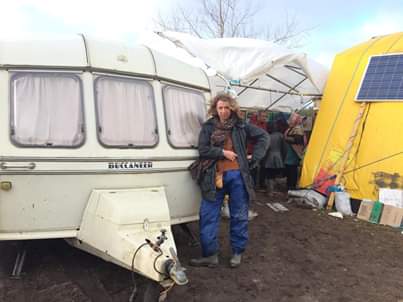
Justine: I spent a fair amount of time in the Jungle in Calais during 2015/16. Similar to many people I was really moved by what I saw on the news reports. People who’d travelled through adverse conditions for thousands of miles, only to find themselves in these horribly hostile conditions, sleeping outside, often with no sleep bag, no shelter, no food, no shoes on their feet. So, I started a collection locally thinking I would just take my car over and ended up a month later with four truckloads of donations from all around Somerset. When I arrived, I discovered that there was this emerging kind of infrastructure of volunteers who had been there for a while. And, it was growing – a lot of people self-organising, providing support in the camps and working together with the refugees.
Obviously, there was a huge amount of trauma in the camp. But not only among the refugees but increasingly, vicarious trauma and burn-out amongst the volunteers and no support in place whatsoever. Having had the experience of working with activists and activist burnout, I felt this was something I could directly support. So that’s where my focus went. I ended up visiting the camps 8 or 9 times over the course of a year. With every visit I made relationships with people in the camps too, so apart from providing trauma care for long-term volunteers, I was also going in and out of the camps, providing caravans for young refugee families and one as a safe ‘talking space’ for volunteers. So, I witnessed much of what was happening within the refugee population too.
Sue: I imagine you saw some very distressing situations.
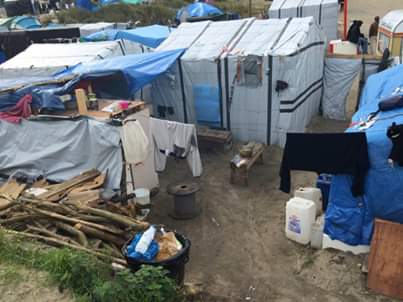
Justine: The most distressing thing for me was how many young children and babies were living in such appalling conditions. I’m a mother and I felt huge compassion and empathy for the parents of young children in the camp, and for the many unaccompanied children who were surviving alone. These were such desperate circumstances combined with a toxic mixture of very vulnerable people, a lack of basic sanitation, hunger, violence and human exploitation.
This is what societal collapse looks like. So many of the refugees had only recently been living lives very similar to ours – professionals with good jobs, middle-class university graduates, young families with dreams and aspirations – all reduced to living under tattered tarpaulin in the mud of northern France.
I had to keep reminding myself that we were living in the 21st century. It brought up a lot of frustration and anger for many people because we have at our fingertips so many ways to preserve life. You go back to keeping people alive unnecessarily in one extreme to young children being left to die in refugee camps in France because of our border controls and immigration policies.
Sue: Yes, it’s a very different experience to feeling ill and calling 999, knowing – for all our moaning – the NHS will pick up the pieces.
Justine: It was just so strange to have to keep reminding myself, ‘I am in Europe’ not Asia, and this strange juxtaposition between literally getting off a ferry, with its cappuccinos and comfortable seating, and five minutes later being in this very different world. But it certainly wasn’t all despair. There was so much creative self-organisation – among both refugee and volunteer communities and in-between. I ate some of the best Afghani food and enjoyed the same dishes I had eaten in the mountains of Pakistan years before, listening to same mountain folk songs being sung in the camp kitchens. So, a lot of different emotional responses were evoked, and I am someone who is fuelled by frustration. That’s the energy that goads me into action.
Sue: Have you always had a strong social conscience?
Justine: I’ve been involved in activism on and off most of my adult life – aged 17 I was standing on the picket lines with the miners in Yorkshire and protesting against Apartheid. I’d found some sense of belonging amidst the activist world after leaving home, but I think a lot of my activism has its roots in a trauma response – I see this a lot in social change groups. There’s this fight response at the fore.
Sue: Can you explain this a little more.
Justine: I come from a very poor working class, very deprived and actually quite a traumatic childhood. My mum was an alcoholic and I left home when I was 16. I only saw her maybe four or five times after that. I never really had a childhood because I had to take care of my younger sister and I had to start working early to put food on the table. So, my twenties were like having the childhood I never had in some ways. I was travelling for around for ten years and when I came back, I tried to find my mum but found out she had died two years previously. She died completely on her own. That was a really pivotal, shocking, difficult experience for me, which changed my relationship with death. It made me ask myself, ‘What kind of death do I want to have?’
I went into a really dark place for a few years after that. It was a homecoming with a real crash as I had been doing a lot of spiritual bypassing and experimentation with my own consciousness. I had to roll up my sleeves and work with a lot of what I’d been running away from in my history, which actually led me to eventually becoming a therapist. So, coming back to your question, much of the work I’ve been involved in around social change has been at least partially fuelled by my own trauma ‘fight’ response. I’m growing increasingly aware of this. I have teetered around the edges of burn-out on and off over the years and I see this so much in the world of activism and social change.
Sue: It’s interesting how our most painful experiences often prompt us to become therapists.
Justine: Yes, it is – and there’s a second part to this story. I had also lost contact with my father, whom I didn’t grow up with. I hadn’t seen him for 12 years and I re-established contact with him to find out he was dying from cancer. So, we kind of rebuilt our relationship over the course of a couple of years – and I sat with by his bedside in a hospital for two weeks while he was dying. I don’t know if I could say it was a good death because he was very resistant to dying. It certainly wasn’t the classic bedside making-amends-talking-it-all-through-and-it’s-all-great experience. It was really, really hard but I wanted to be there for him in the way he had never been able to be there for me, and in doing that there was a sense of ‘I’m going to do this for you, and I’m going to do what I couldn’t do for my mum with you as well.’
Sue: That’s an extraordinary thing to hear about by your willingness to sit with your father knowing it was about offering this to your mother as well. I imagine this was immensely healing for you.
Justine. Yes, it was.
Sue: I know you’re really involved with positive deep adaptation and the implications of what all of us are facing globally. Do you think having a profound relationship with death and dying helps us to face whatever we are going to experience? Death is one thing, but the thought of extinction is completely different.
Justine: I think it’s essential. In terms of PDA I think, for me, that’s the key. Coming back to the work of Ernest Becker and Soloman – they suggest that our social structures are built on the terror and denial of death and our slavish, mass collusion of ‘the show must go on!’ at all cost. This is creating our relentless, business-as-usual trance we mostly seem to be in. But we now have the invitation to turn and face death fully, which includes the very possible prospect of near-term human extinction.
But what could it mean for us if we are fully able to meet this fear? I believe this is a very fundamental piece of what we need to do. That’s why I like the death cafe work. This whole experience with COVID-19 seems part of the deep adaptation process. It’s is a kind of initiatory step into something very, very unknown; very uncertain.
Sue: Yes, it’s about finding a way to sit with the ambiguity of what’s happening. We can’t fix what is happening even though it’s human nature to want to fix what’s going wrong. I believe this is reflected in the way we are desperate to medicate end of life to try and stop it happening.
Justine: That completely resonates with me, especially at the moment. I do wonder what would happen if I was one of those people who had complications from COVID-19. I don’t feel that afraid of death. But I’m afraid of a bad death, and, for me, a bad death would be in a hospital bed being wired up for as long as possible artificially. I don’t want that.
Sue: It’s really important that all of us take responsibility for how we want to die, especially as part of supporting the positive deep adaptation movement.
Justine: Yes, and I think that many of us want life nicely cling-film wrapped to protect ourselves from what’s coming. Our culture conspires to keep us disconnected from the process of what it takes to arrive at this unimaginable point. It takes me back to this keyword of disconnection. 21st century post-industrial, capitalist, consumerist culture fundamentally disconnects us from the earth, from the land, from ourselves and from our bodies. It encourages us to become disembodied and living in our head. How can we die well within that place of disconnection?
Sue: I really resonate with what you are saying. But, in my experience, being around death changes this. Something really powerful happens to us.
Justine: Yes, it’s as if death is the ultimate in the embodied experience. It’s the final lesson in embodiment before we have to let go.
Sue: Do you think it’s important to bring the dark into conversations about death and dying?
Justine: I like to hang out in the shadows a little bit because that’s where there’s a lot of juice. There’s a Tibetan Buddhist practice of Chod – Cutting through the Ego – where part of the practice is to meditate in graveyards and charnel grounds. There is an element which involves the practitioner offering up their own body and feeding it to invisible demons. It’s akin to the powerful western psychological shadow work: facing and befriending those exiled, demonised parts of ourselves, as well as fully confronting our own impermanence. Life might be so different if we all engaged in these kinds of practices in some way. To learn to spend time and not be so afraid of our dark side. I do feel that if death was more visible and in the open it would support our understanding of these dark places too.
Therefore, for me, I can only see that talking about death helps us to be more in contact with who we are and with life itself.
.
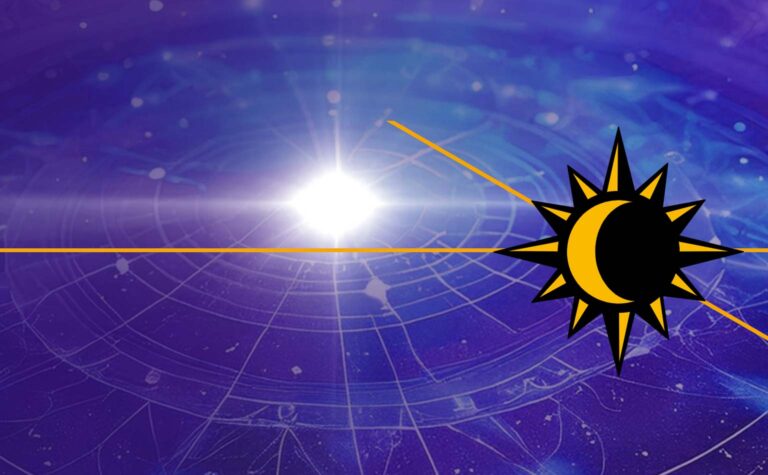

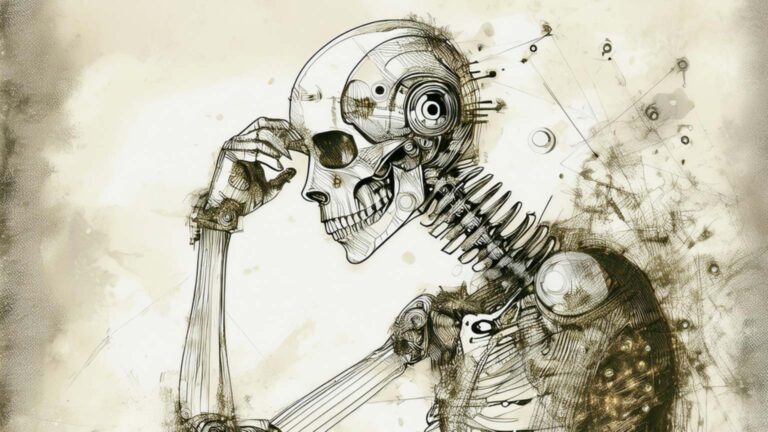

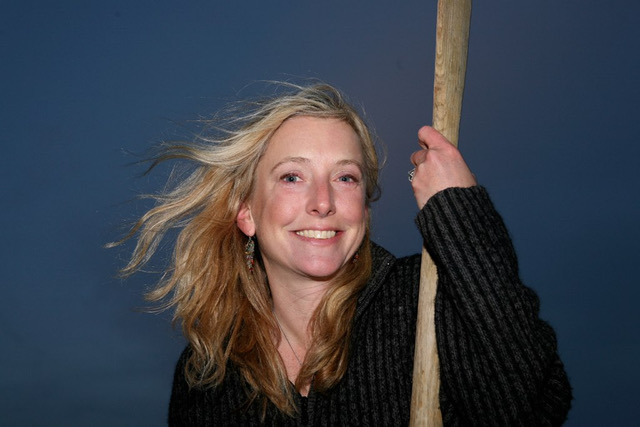
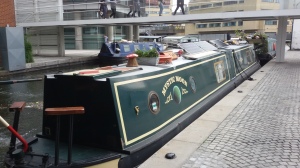


2 comments
David B.
Certainly thought-provoking. Thank you.
Sonya Steller
I found this so moving, pertinent and full of experiential wisdom. Thank you for the interview.